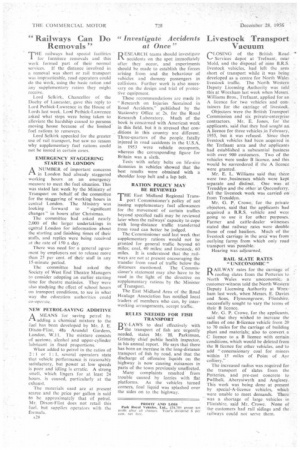"Railways Can Do Removals
Page 30

If you've noticed an error in this article please click here to report it so we can fix it.
THE railways had special facilities for furniture removals and this work formed part of their normal services. If the distance involved in a removal was short or rail transport was impracticable, road operators could do the work, using the basic ration and any supplementary ration they might receive. Lord Selkirk, Chancellor of the Duchy of Lancaster, gave this reply to Lord Pethick-Lawrence in the House of Lords last week. Loyd Pethick-Lawrence asked what steps were being taken to alleviate the hardship caused to persons, moving house because of the limited fuel rations to removers. Lord Selkirk appealed for the greater use of rail transport, but saw no reason why supplementary fuel rations could not be issued in certain cases.
EMERGENCY STAGGERING STARTS IN LONDON
1--V A NUMBER of important concerns in London had already staggered working hours as an emergency measure to meet the fuel situation. This was stated last week by the Ministry of Transport on behalf of the committee for the staggering of working hours in central London. The Ministry was looking forward to "significant changes in hours after Christmas. The committee had asked nearly 2.000 of the larger undertakings in cptral London for information about the starting and finishing times of their staffs, and replies were being received at the rate of 150 a day. There was need for a general agreement by employers not to release more than 25 per cent, of their staff in any 15-minute period. 'I he committee had asked the Society of West End Theatre Managers to consider adopting an earlier starting time for theatre matinees. They were also studying the effect of school hours on transport conditions, to see in what way the education authorities could co-operate.
NEW PETROL-SAVING ADDITIVE
rTh.A MEANS for saving petrol by adding a chemical mixture to the fuel has been developed by Mr. J. E. Dixdn-Flint, 48a Arundel Gardens, London, W.I I. The mixture consists of acetone, alcohol and upper-cylinder lubricant in fixed proportions. When added to petrol in the ratios of 2 : 1 or 1 : 1, several operators state that vehicle performance is reasonably satisfactory, but power at low speeds is poor and idling is erratic. A strong smell, which lingers for at least 24 hours, is caused, particularly at the exhaust. The materials used are at present scarce and the price per gallon is said to be approximately that of petrol. Mr. Dixon-Flint does not retail this fuel, but supplies operators with the formula.
A28




















































































